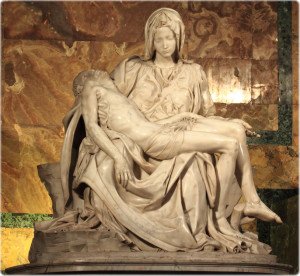
The Beauty and pain of the Samaritan
The Korean-german a philosopher Byung-Chul Han claims the wound in Belo’s participation, nothing more significant than Michelangelo’s The Pieta, an Italian economist denounces in his book “The Sore of the Other”, trying to establish as interpersonal relations are a source of joy and “blessing” to man, but we could say of beauty as well.
in Belo’s participation, nothing more significant than Michelangelo’s The Pieta, an Italian economist denounces in his book “The Sore of the Other”, trying to establish as interpersonal relations are a source of joy and “blessing” to man, but we could say of beauty as well.
Beauty is situated in reciprocity, and it is not a question of returning the “value” according to what has been paid, the society where the measure is only a mathematical value, “wound” and “blessing” are two inexplicable poles, which characterize interpersonal relationships and are also a source of happiness, joy and beauty for man, but do not fail to pass through “pain.”
The word wound, in other languages it’s like having a bruise, en english is interesting because wonderfull is wounderful, well we could create the word wounderfull, for the beyond-wounded of the other, and is a sense of word the economist Luigino Bruni.
A child who is born is a pain, the pains of childbirth, the culture of the polite and immunology, Sloterdijk’s term that is also used by Chul Han, are unrealities that can lead to an irrational pain, indifference and pain contempt for the painful and excluded. It is not enough to give a “medal” to the heroine teacher who fought to the death to save the children, it is necessary that the culture, the beautiful and the economicist ideology value the relations, affection and appreciation for those who suffer turning their backs on suffering, the principle of invisible of one person.
The biblical parable of the Samaritan (good is a euphemism to say that the Samaritans were evil) there was a man wounded on a road passed several people, including priests and went on ahead, the Samaritan that we can say a “common” type stopped and bailed him out, he was neither a religious nor a philanthropist.
Is possible in this sense Maria is a samaritan that suffer with Jesus in Pietá.
I call this parable with another in which the king prepared a feast and the guests did not come, the banquet of Plato and the table of various liturgies and cosmologies are references to the relationship between the men, instead of the guests the king ordered that they were the “peripheries “And invite the common people to come to the banquet (Mt 22,1-14.
It is not prepared for the true banquet that those who move away from the pain, create the polished and immunological environment, where those who suffer and who are excluded do not participate, the true feast is that of which fought with sacrifices and solidarity for all to participate.
BRUNI, La ferita dell’altro. Economia e relazioni umane, Il Margine, Trento 2007









